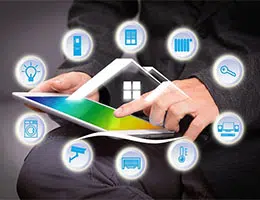 The notion of immotics is not part of the dictionary of the Royal Spanish Academy ( RAE ), where the term inmoto is recognized, which derives from the Latin word immōtus . Immoto is an adjective that is used to describe what does not move and/or cannot be moved .
The notion of immotics is not part of the dictionary of the Royal Spanish Academy ( RAE ), where the term inmoto is recognized, which derives from the Latin word immōtus . Immoto is an adjective that is used to describe what does not move and/or cannot be moved .
The habitable property that, due to its characteristics, always remains fixed or stable, without movement, is called real estate . Houses and buildings, therefore, are real estate.
With these ideas clear, we can advance in the definition of real estate . This is the name given to the set of systems and technologies that allow the automation of a property . Thanks to building automation, it is possible to remotely control and supervise various functions and states of a building.
Inmotics, therefore, is linked to home automation , which refers to those tools that serve to automate the facilities of a house. While home automation is used to manage energy, security and communications inside a home, real estate automation is associated with the management of a building as a whole , and not a single unit.
That is why in practice the concept of real estate is usually applied to facilities in the service or production sector , such as a hotel , a bank, a hospital or an industrial plant. With building automation, the use of resources can be managed intelligently and thus increase comfort and minimize maintenance costs.
Regulating cooling, heating and ventilation, controlling lighting and managing the opening and closing of doors are some of the actions that can be programmed or managed through building automation.
 It is important to note that most electronic and electrical systems installed in buildings are undeniably inefficient, since they produce unnecessary waste of all the resources to which they access. Water, electricity and natural gas , among others, are used excessively unless there is a system that has intelligent control and deactivates certain devices when no one needs them.
It is important to note that most electronic and electrical systems installed in buildings are undeniably inefficient, since they produce unnecessary waste of all the resources to which they access. Water, electricity and natural gas , among others, are used excessively unless there is a system that has intelligent control and deactivates certain devices when no one needs them.
This excessive use of natural resources especially affects the environment, intensifying the imbalance due to the impossibility of renewing themselves at the same rate that human beings consume them. But the damage does not only reach the planet, but even from an obtuse and selfish perspective we can say that the waste caused by the absence of an inmotics system also negatively affects consumers, both individuals and companies.
Companies that do not adopt real estate automation deprive themselves of reaching their maximum level of productivity and also of responding appropriately to an emergency situation, precisely by wasting the energy that they might need then. The well-being of workers is another point to take into account when deciding on real estate: both in the short and long term, using only the necessary resources can benefit them in the form of higher salaries, more comfortable work spaces and more frequent investments in technological advances useful for their development.
The energy savings that a company can achieve in its facilities through building automation is greater than 40 percent. It also drastically decreases the need to hire staff for maintenance services, as these tasks are carried out automatically. In addition, the wear and tear of the devices and the building is less, another reason why control by human personnel is not required with the same assiduity. Clients and investors, on the other hand, appreciate the apparent modernity that real estate provides.
